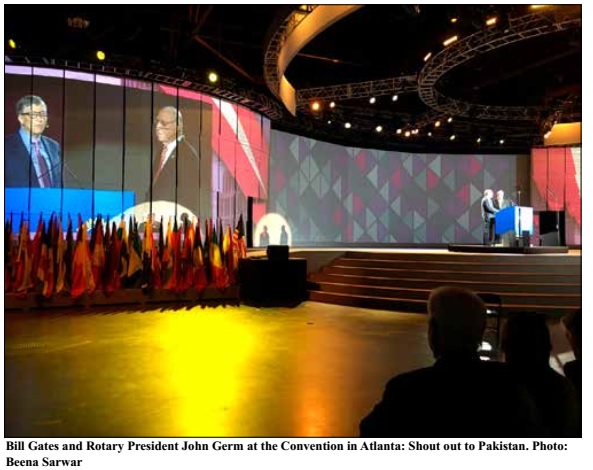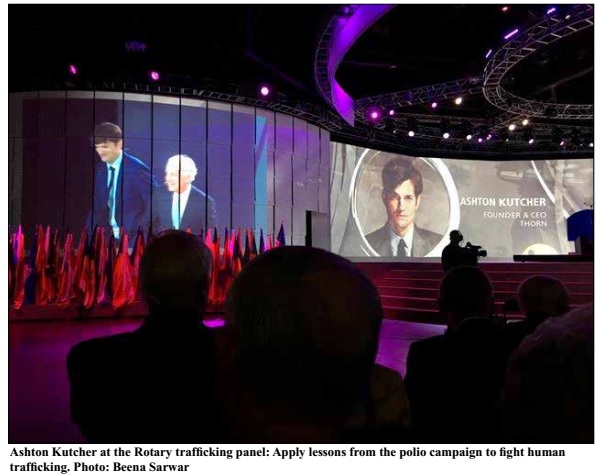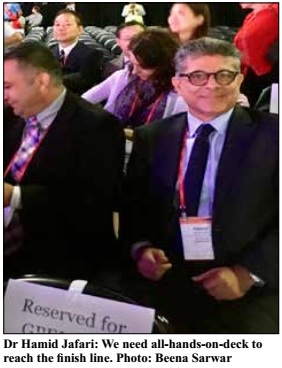Why the Diaspora Must Support Pakistan’s Efforts against Polio
By BeenaSarwar
Boston, MA

As 2017 draws to a close, it’s worth highlighting the quiet success story underlying the headlines about Pakistan. This is a country on the verge of eliminating a foe that poses a critical threat not just within national borders but also the region.
The dramatic drop in polio cases over the past three years -- down by a whopping 99 percent, from 306 cases in 2014 to just 8 in 2017 so far -- shows what political will, commitment, coordination and consistency can achieve.
The progress against polio in Pakistan “is a hard fought, hard earned gain, substantiated by solid evidence,” says Dr Hamid Jafari, Principal Deputy Director, Center for Global Health at the Centers for Diseases Control & Prevention (CDC). “This is not the time to be skeptical.”
He should know. As head of the polio eradication team in India on behalf of the World Health Organization (WHO) from 2007-2012, he helped India become polio-free, one step closer to the region becoming polio-free.
“The diaspora and the nation should not be skeptical – but the polio eradication program has to be skeptical,” notes Rod Curtis of the UNICEF’s Polio Eradication Unit who is present at my meeting with DrJafari in Atlanta. “There are lessons to be learnt from India.”
Curtis recalls the worry during the first three months of the year in India where no cases appeared. The virus could have popped up any time. “We are very fortunate to have learnt the lesson from India – that we’re not done until we’re really done. And we all desperately want to be done.”

Those involved in this fight globally know it is just a matter of time before polio joins smallpox in extinction. The polio campaign’s success over the past decades is evident in the 16 million individuals around the world who are walking because they were vaccinated. But until the wild poliovirus is wiped out, children, especially those who go un-vaccinated, remain at risk.
Pakistan, Afghanistan, and Nigeria, the only three polio-endemic countries in the world, are nearing success. Nigeria was preparing to celebrate two years of being polio-free in 2016 when new cases of polio cropped up. There have been zero in 2017, giving cause for optimism that Nigeria may be declared polio-free this year.
To be considered polio-free, a country must maintain high immunization rates and high-quality surveillance, and have no cases of polio for at least three years. Only when all countries in a region meet these criteria can it be certified as having eradicated polio.

All hands-on-deck
“If we fail, the poliovirus will return, kill and paralyze,” as Bill Gates noted in his keynote speech at the Rotary International Convention in Atlanta in June.
So, what can the Pakistani diaspora do to support their home country’s polio campaign?
“We now need all-hands-on-deck,” advocates DrJafari. The Pakistani diaspora, including its medical community members, need to be involved proactively – “with tongue, brain, and deed.”
“Whatever your constituency back home is – family, friends, colleagues in cities and villages – we all need to get down to basics and ensure that every child gets vaccinated and every case of floppy paralysis reported and investigated,” he urges.
Cornered, the wild poliovirus is most likely to find sanctuary and occur in places and populations that are harder to reach – “a particularly treacherous phase.”
Now, it is particularly important to immediately detect and respond to any cases discovered. “It has to be an emergency response to deliver the final blow. Particularly at this final stage when the concerns for getting blamed get so high, any Union Council or District that reports a polio case should be praised and rewarded, not penalized.”
Senator Ayesha Raza Farooq, the Prime Minister's Focal Person on Polio Eradication in Pakistan, is fully cognizant of these challenges, and the program enjoys broad political support, with all political parties across the board committed to eradicating the virus. With the current Prime Minister, ShahidKhaqanAbbasi also fully on board, Senator Farooq expects the program to continue full throttle.
“Realizing how critical it is to report cases and environmental samples the polio program we have continued to strengthen and expand surveillance to make sure that we catch the virus wherever it’s present. So that we really mean zero when we say we are zero,” she stresses.
Pakistan’s polio program focuses on 53 strategically selected sites, and works closely with provincial, district and union council teams. “We encourage unearthing issues, rather than brushing things under the carpet,” Senator Farooq informs me. “We continuously assess and evaluate accountability mechanisms to reward the good performers and penalize those involved in fudging or misreporting.”
The ultimate in equity
The fight against polio has wider implications. “Polio vaccinations,” observes DrJafari, “are the ultimate in equity; you have to reach and serve everyone.”
At the massively-attended Rotary Convention, Neven Mimica the European Union’s Commissioner for International Cooperation and Development echoed these views. “It is also about eradicating poverty.”
To eradicate polio, countries and communities must collaborate within a country and the region, as Bill Gates stressed. It is encouraging that Pakistan and Afghanistan, sharing a common poliovirus transmission zone, are working together in this goal, rising above political differences.
The Bill & Melinda Gates Foundation joined the Global Polio Eradication Initiative (GPEI) ten years ago, adding momentum – and dollars – to the campaign spearheaded by Rotary International, in collaboration with the WHO, the CDC, and the United Nations Children’s Fund (UNICEF).
The world’s largest public-private partnership, GPEI works with national governments and millions of volunteers – “individuals linking arms and persevering,” as Gates said.
GPEI has raised USD 14 billion international investment towards the goal of a polio-free world. But this is not just about money, as DrTedros, the new Director General of WHO notes. More than that “it’s the passion, commitment and energy” of those driven by the vision of a polio-free future -- “health for all and all for health”.
Highlighting the work of Pakistan’s polio workers, Gates said the campaign is “testament to the kindness, compassion and spirit of helping others.”
Beyond polio
Given the encouraging results, the program’s template may be used as a prototype to tackle other life-threatening health issues and vaccine-preventable deaths – measles, diarrhea, pneumonia, and other scourges, like malaria and TB.
The experiences of local planning, supervision, commitment and accountability at all levels may also be adapted to impact the critical area of education, especially for girls.
Nigeria has applied the lessons learnt from its polio eradication program to fighting the deadly Ebola outbreak.
The possibilities are endless. At the Rotary Convention panel on human trafficking, actor Ashton Kutcher suggested that the inspiration provided by the polio program could even be used to end human trafficking.
Another lesson learnt from the fight against polio is the importance of regular samples and testing. There are 125 environmental surveillance sites in Afghanistan, Nigeria, Pakistan, said Gates.
A third essential lesson is the importance of mapping. In Nigeria, only after the country had been properly mapped, was it discovered how many villages had got left out. This lent fresh impetus to the polio campaign.
India’s success in polio eradication and Nigeria’s near success owes much to engagement with religious and community leaders – a fourth important lesson that Pakistan and Afghanistan are also applying.
As Pakistan reaches closer to eliminating polio and contributing to a worldwide eradication of this deadly disease, the diaspora must support its polio program. The bottom line is the need to reach and vaccinate every child to wipe out polio, not just from the remaining three polio-endemic countries, but from the world.
(BeenaSarwar is a journalist, journalism teacher and human rights activist based in Boston. Website: www.beenasarwar.com. She tweets @beenasarwar)
-----------------------------------------------------------------------------

